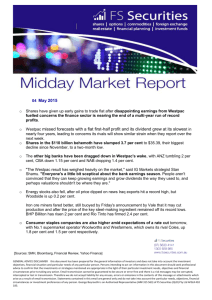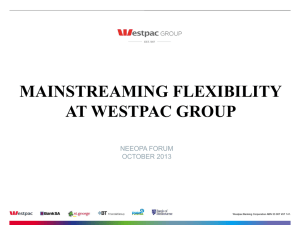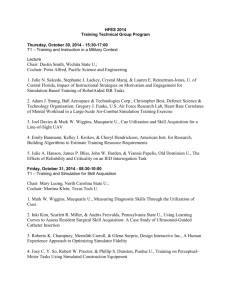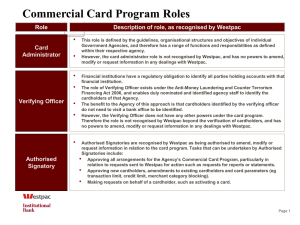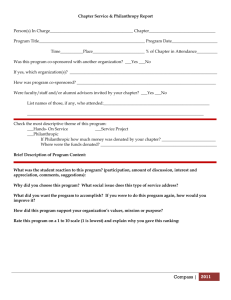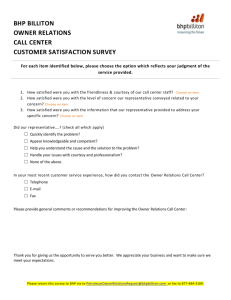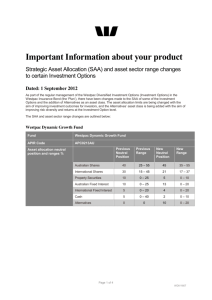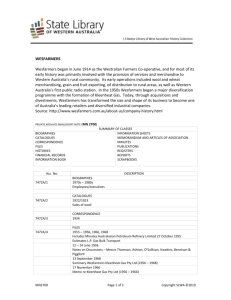CSR and Corporate Community Investment
advertisement
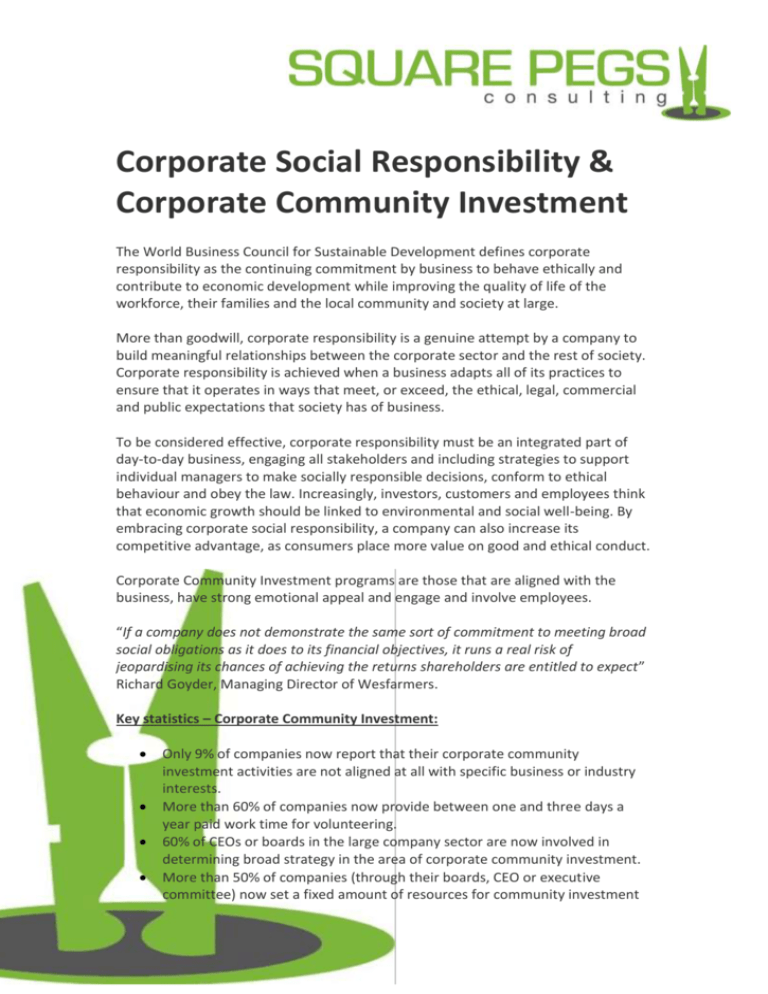
Corporate Social Responsibility & Corporate Community Investment The World Business Council for Sustainable Development defines corporate responsibility as the continuing commitment by business to behave ethically and contribute to economic development while improving the quality of life of the workforce, their families and the local community and society at large. More than goodwill, corporate responsibility is a genuine attempt by a company to build meaningful relationships between the corporate sector and the rest of society. Corporate responsibility is achieved when a business adapts all of its practices to ensure that it operates in ways that meet, or exceed, the ethical, legal, commercial and public expectations that society has of business. To be considered effective, corporate responsibility must be an integrated part of day-to-day business, engaging all stakeholders and including strategies to support individual managers to make socially responsible decisions, conform to ethical behaviour and obey the law. Increasingly, investors, customers and employees think that economic growth should be linked to environmental and social well-being. By embracing corporate social responsibility, a company can also increase its competitive advantage, as consumers place more value on good and ethical conduct. Corporate Community Investment programs are those that are aligned with the business, have strong emotional appeal and engage and involve employees. “If a company does not demonstrate the same sort of commitment to meeting broad social obligations as it does to its financial objectives, it runs a real risk of jeopardising its chances of achieving the returns shareholders are entitled to expect” Richard Goyder, Managing Director of Wesfarmers. Key statistics – Corporate Community Investment: Only 9% of companies now report that their corporate community investment activities are not aligned at all with specific business or industry interests. More than 60% of companies now provide between one and three days a year paid work time for volunteering. 60% of CEOs or boards in the large company sector are now involved in determining broad strategy in the area of corporate community investment. More than 50% of companies (through their boards, CEO or executive committee) now set a fixed amount of resources for community investment in the annual budget cycle. Key examples of Corporate-Community Investment (Corporate Responsibility Index 2007 winners and ASX top 20 companies): ANZ: In 2007 ANZ contributed $17,810,087 to community programs, including over $10 million in cash. Over 60,000 hours in staff volunteering were donated, and a 15% participation in workplace giving achieved in 2007. NAB: In 2007 invested $25.9 million in local community initiatives. NAB assists disadvantaged communities by developing microfinance; improving access to financial services; helping to address financial literacy; helping to address difficult community issues; and providing support for communities in need. Westpac: In 2006/07 $35.5m was contributed by Westpac to community investment projects (NB this is exclusive of Westpac Foundation contributions) In 2006/07 Westpac employees donated $1.9m to charity, including matching by the Bank. Xstrata: Xstrata plc contributes a minimum of one percent of its pre-tax profit to community initiatives. Xstrata supports programmes in the areas of community health, education, environment, social and community development and culture and art. In 2007 Xstrata set aside a total of $102 million (internationally), or 1.2% of Group profit before tax to fund these programs. Telstra: Since 2002, more than $25.6m has been granted to more than 4,000 projects through the Telstra Foundation. The Telstra Foundation committed more than $3.9m in grants over 2007/08 CBA: Through the CBA Local Grants Program, $750,000 donated to initiatives for the health and wellbeing of Australia children. July 2008 launched a reconciliation action plan. Woodside: In 2007, 85 community partnerships (worldwide) at a cost of over $10 million. Wesfarmers: The Board of Wesfarmers Limited makes donations up to an annual ceiling of 0.25 per cent of before-tax profits. In 2006/2007 this amounted to almost $2.6 million. Woolworths: In 2007 Woolworths donated over $10 million to community partners and charities. BHP: BHP invested $USD29,726,723 in community programs in Australia over 2006/2007. BHP have a target to voluntarily invest 1 per cent of pre-tax profits (on a historic three-year rolling average) on community programs. In 2006/07, the Company invested US$103.4 million on community programs (internationally), including cash, in-kind and management time, which was 1.1 per cent of pre-tax profit. The Macquarie Group: The Macquarie Group Foundation contributed $A17.3 million to more than 800 community organisations in the year to 31 March 2008, a 38 per cent increase on the previous year.In addition, Macquarie staff around the world raised $A5.7 million for not-for-profit organisations. This figure does not include the hours of time given by Macquarie staff as volunteers, mentors, pro bono service providers and members of not-forprofit boards and executive committees. Others: PricewaterhouseCoopers: In 2007/08 PricewaterhouseCoopers distributed $3.8 million to charitable causes through the PricewaterhouseCoopers Foundation. “To us, the relationship [with our charity partners] is not just about providing financial support, but valuable expertise, resources, advice and logistical support – leveraging the core competencies of PwC to make a sustainable difference. It is also about our staff developing as responsible leaders, and helping to make a tangible difference.” (PwC Foundation website)
